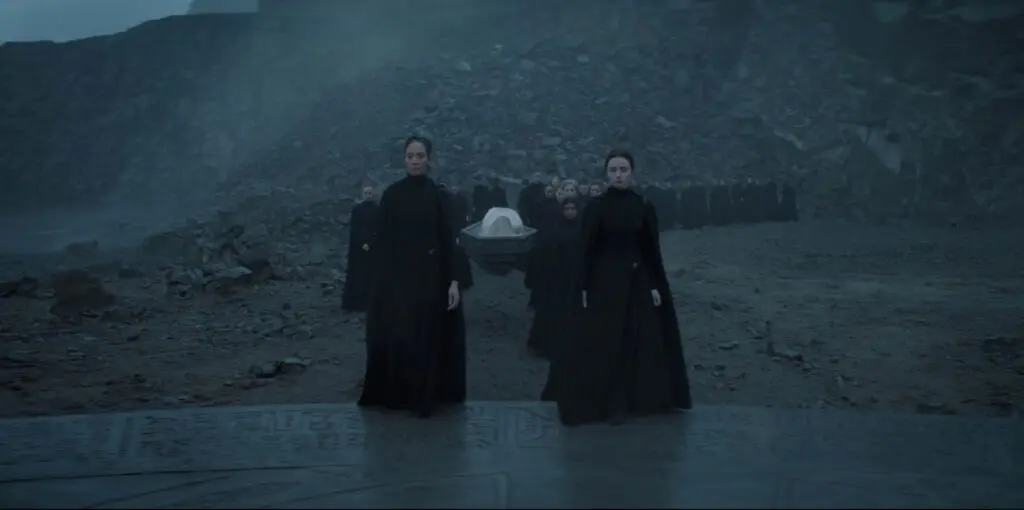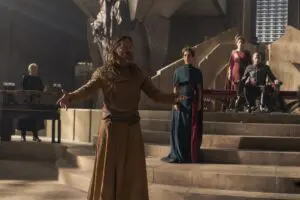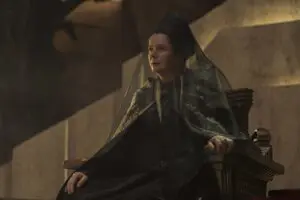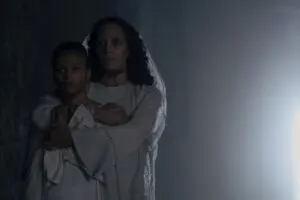Summary
Dune: Prophecy gets off to a compelling start in Episode 1, “The Hidden Hand”, setting up an intriguing premise and building to a shocking climax.
Here’s a relevant question: Is Dune: Prophecy the next Game of Thrones? Can it be? Should it be? Season, Episode 1, “The Hidden Hand”, has enough crucial similarities to suggest the HBO spin-off might be the next best thing, but it has a long way to go – and a bit bigger barrier to entry to clear – before we can make that claim.
Five years on, it’s crazy that every streaming platform and big television network remains in an arms race to create a viable successor to George R. R. Martin’s fantasy saga. It’s not an exact science. You don’t need dragons, necessarily, but you probably need something big and otherworldly and expensive-looking (it’s sandworms here). It doesn’t even need to be strictly fantasy; Apple TV+ tried it with See and Foundation, which were more sci-fi than anything else (like Dune!), but neither really captured that same feeling of knowing the whole world – or most of it, anyway – is tuning into the latest episode.
Dune: Prophecy Explores The Early Days of the Bene Gesserit
I’ll say this for “The Hidden Hand” – it has the right ingredients. It feels big and expansive and expensive. It has a lot of shady politicking and backstabbing and you can tell a whole bunch of people are going to die in brutal and unexpected ways. The cast is great, and you can see quite clearly how the material has ties to Denis Villeneuve’s all-star movies, despite being set 10,000 years before them. It’s very much the Duniverse’s House of the Dragon, which was HBO’s previous effort at creating the next Game of Thrones, albeit with the advantages of being set in the same universe.
Dune: Prophecy is based loosely on the 2012 prequel novel Sisterhood of Dune and concerns primarily the formation of the Bene Gesserit, the soothsaying precognitive superwomen who come to believe Timothee Chalamet’s Paul is a messiah. Early on, we see how the founder of the sisterhood, Mother Raquella, laid the groundwork for the whispery influence that the Bene Gesserit would become known for by matching up the DNA of powerful human families and creating an academy of “Truthsayers” on the barren planet Wallach IX, to be installed in the courts of every ruling clan.
In this way, the Bene Gesserit can manipulate galactic events and exert subtle control over everyone and everything, hiding in plain sight disguised as meek, helpful women who secretly have the power to build and topple dynasties. It’s a very good hook, especially when Raquella dies almost immediately and leaves behind a power vacuum to be filled by Valya Harkonnen, despite some pushback from the members of the sisterhood who think the whole plan’s in rather bad taste.
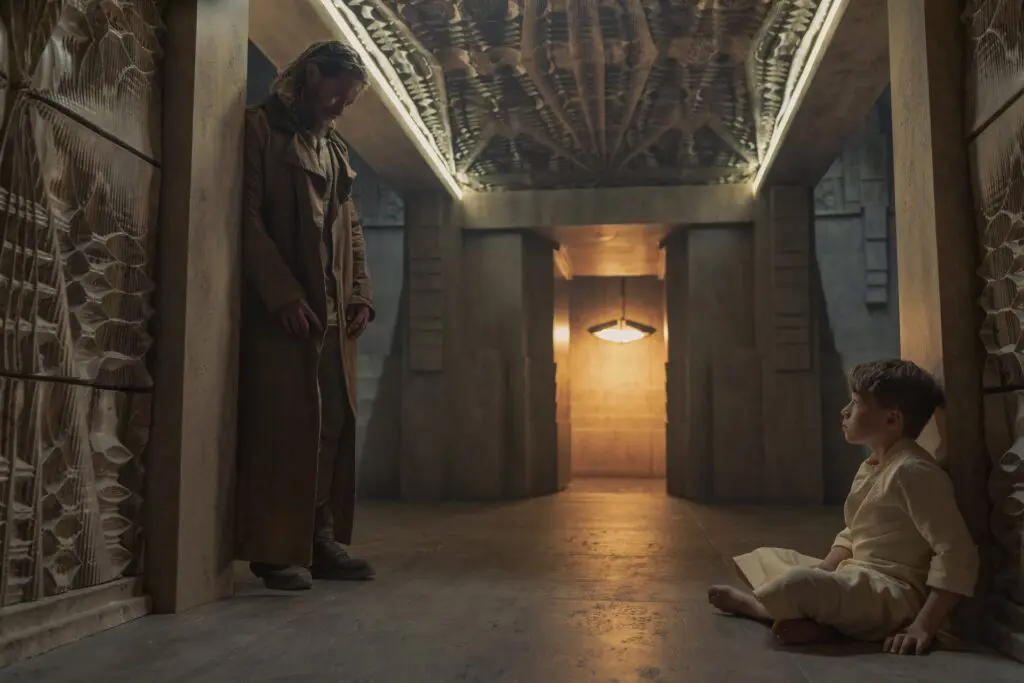
Travis Fimmel and Charlie Hodson Prior in Dune: Prophecy | Image via HBO
Politicking
The mythology of Dune is a bit complex, but Prophecy does a good job in Episode 1 of making the essentials comprehensible. It helps that some of them are familiar from the movies – production of Spice, aka Melange, remains of key importance, since the drug is native to the planet Arrakis and is integral to space travel, and Arrakis is still a dangerous desert world full of hungry worms and a vicious native tribe known as the Fremen who tend to get the blame for everything.
With these details, you can get a good sense of how and why Valya wants to get a sister into House Corrino, the rulers of the Imperium. She targets a princess, Ynez, and arranges a marriage to the nine-year-old scion of House Richese to secure the big guns necessary to keep spice production flowing. Ynez will remain at the academy until her husband comes of age. Everyone’s happy – not necessarily Ynez, of course, but the people who really matter politically. This is pretty simple stuff to grasp.
The wildcard is Desmond Hart, a Corrino soldier who becomes the sole survivor of what is reported as a Fremen attack, but he’s careful to tell the Emperor, Javicco Corrino, that someone’s not telling the truth and something sneaky is afoot. Well, he’s right – it’s him.
“The Hidden Hand” Turns Up The Tension With Its Ending
For most of its runtime, Dune: Prophecy Season 1, Episode 1 is pretty chill. Sure, there’s a bit of mind-control throat-slitting here and there, but it’s mostly a string of catty conversations that give us a flavor of the Bene Gesserit and suggest – usually through prophecy – some dark events may well be ahead. It isn’t until the ending that things take a truly dramatic turn.
But it’s a big turn. Hart, through what seems like some kind of pyrokinesis, assassinates the young boy, Pruwet Richese, and Javicco’s trusted Truthsayer, Kasha, who both die screaming and burning. It’s quite the nasty turn and raises a lot of questions about Hart that Valya will need to answer quickly if she’s to preserve the sisterhood (which we know from the movies that she does, but whatever.)
What’s up with the burning powers? What is the significance of Hart having seemingly been swallowed by a sandworm? Who is he working on behalf of?
These are compelling questions for the premiere of Dune: Prophecy to close with, and they’ll doubtlessly have people tuning in for the next episode to get some answers. Whether or not this strong opening hour manages to capture imaginations on the scale that HBO is hoping remains to be seen, but it’s certainly a confident step in the right direction.
RELATED:

